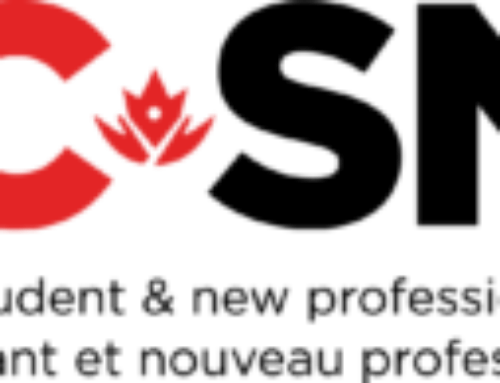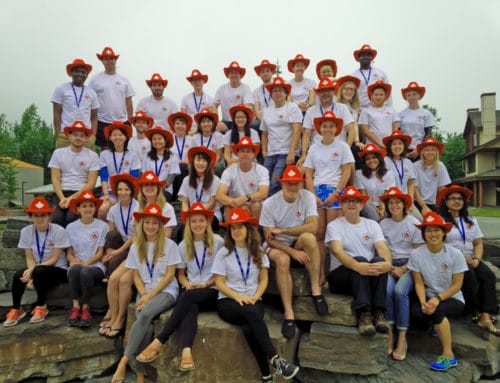Today’s post comes from Lindsay Leduc (& excerpt from Lee Rysdale). Lindsay is a Registered Dietitian and a medical student at the Northern Ontario School of Medicine. She is also the current Recruitment Coordinator of the OC-SNP National Executive. You can find more about Lindsay here!
Many describe learning in medical school as trying to drink from a firehose. There are many things to learn and only a small amount of time to attempt to retain and consolidate an abyss of information. Unfortunately, one major constituent missing from said firehose is education on nutrition and weight management. We know that 60% of the factors that influence health and quality of life are related to lifestyle (1). We also know that many chronic diseases such as metabolic syndrome, diabetes, cardiovascular disease, hypertension, mental health, and so on are highly linked to nutrition and lifestyle, and yet, future of health care providers are not being adequately trained to address these topics and issues. We can proficiently describe the physiological basis of hypertension and prescribe the recommended antihypertensives, yet we are incompetent and uncomfortable giving the lifestyle and nutrition recommendations that are pertinent to our patients’ condition. There is currently a disconnect between our medical education and what patients really need from their health care providers.
At first, I thought that this was an issue of our education being “outdated” and that the curriculum was behind the times. But I noted that we are on par when it comes to the newest medications available, imaging study technologies, and cancer treatments and biologics. Therefore, it is not the education, but the culture around medical education that needs an overhaul. Society looks very different than it did 30 or 40 years ago, yet we still value the pharmacological “quick-fixes” over re-evaluating the bigger picture changes that have occurred that need to be addressed.

The greatest predictor of patient nutrition counselling by physicians is the physician’s own perceptions of nutrition and eating habits (2). Most physicians do not feel comfortable, confident or adequately prepared to provide nutrition counselling (3). This sense of inadequacy is commonly associated with the minimal education of basic nutrition and nutrition interventions provided during medical school (3,4). A significant number of Canadian medical students are dissatisfied with the nutrition education they receive and their ability to provide relevant and appropriate nutrition counselling (5).
Medical students are a key demographic for health and wellness interventions and such programs could have a significant impact on their future health practices as well as patient encounters (6). Moreover, many students believe that their undergraduate program should dedicate more time to nutrition education (5). Being supported and having these skills early on can foster healthy lifestyle habits which can be translated into physician practice in later years and ultimately increase patient awareness of nutrition and healthy eating (6,7).
Currently, some Canadian medical schools have implemented voluntary or brief amounts of nutrition education into the curriculum. But there are currently no standards in the curriculum or pertinent objectives in the Medical Council of Canada licencing examination. The idea of “Culinary Medicine” (See UoT’s article on this: https://medicine.utoronto.ca/news/food-basics-future-doctors-culinary-medicine-u-t) has become a hot topic when it comes to the implementation of combining food literacy with clinical nutrition recommendations for medical trainees.
To be able to appropriately address chronic disease management such as obesity, diabetes, and cardiovascular disease we must educate our future health care providers with the appropriate knowledge and information to be able to competently and confidently approach and address these health issues. This requires an overhaul of the values and principles of medical education in Canada.
Other programs that have been developed for Nutrition Education in Medical Schools include:
NNEdPro:https://www.nnedpro.org.uk/
NNEdPro Summit:https://meetings.nnedpro.org.uk/international-summit/conference-programme/
WellnessRx: https://www.wellness-rx.ca/,
Nutriton in Medicine: https://nutritioninmedicine.org/
References
- Farhud, D. D. (2015). Impact of Lifestyle on Health. Iranian Journal of Public Health, 44(11), 1442–1444. Retrieved from https://www.ncbi.nlm.nih.gov/pmc/articles/PMC4703222/
- Spencer EH, Frank E, Elon LK, Hertzberg VS, Serdula MK, Galuska DA. Predictors of nutrition counselling behaviours and attitudes in US medical students. Am J Clin Nutr. 2006; 84: 655-662.
- Adams KM, Kohlmeier M, Powell M, Zeisel SH. Nutrition in medicine: Nutrition education for medical students and residents. Nutr Clin Pract. 2010; 25 (5): 471-480.
- Burch E, Crowley J, Laur C, Ray S, Ball L. Dietitians’ prespective on teaching nutrition to medical students. J Am C Nutr. 2017; DOI: 10.1080/07315724.2017.1318316.
- Gramlich LM et al. Medical students’ perspectives of nutrition education in Canadian universities. Appl Physiol Nutr Metab 2010; 35(3): 336-43.
- Tyzuk K. Physician health: A review of lifestyle behaviours and preventive health care among physicians. BC Medical Journal 2012; 54(8): 419-423.
- Canadian Medical Association. CMA Policy: Healthy behaviours – promoting physical activity and healthy eating [Internet]. 2015. Accessed December 10, 2016 at: https://policybase.cma.ca/dbtw-wpd/Policypdf/PD15-12.pdf.






